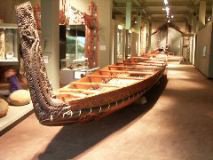 From The Manawatu standard
From The Manawatu standardMaori nautical studies prove popular
09 February 2006By MERVYN DYKES
When Te Wananga o Aotearoa began its Maori nautical studies course the expectation was that daring young men would predominate, but not so - the strongest interest came from young women.
Three years later, the sexes are balancing out and the course is proving so popular that it has to be capped - about 45 students each intake.
"In the beginning, young Maori men were too busy being cool to pick up a pamphlet or a brochure," says course leader Potaka Taite, so it was women who responded first.
"They tended to be professional women and were often hugely stressed out and looking for a way to relax."
Gradually males started asking their womenfolk to pick up course information for them and finally they began fronting up themselves.
The students include a mix of Maori, Pakeha (white), Cook Islanders, Samoans and other ethnic groups.
Their introductory level three course lasts 36 weeks, but the actual instruction occurs in intensive sessions lasting from Friday afternoons to Sundays at 2pm.
During this time, the students stay together as a group at a marae (meeting area) or some other accommodation centre, learning to trust and rely on each other.
"Everyone is on the waka(boat), so it's about paddling and moving in the same direction," says Mr Taite. "It is team work and you need to know who your crew members are, otherwise you will have difficulty working well together on the water."
The introductory course covers much more than traditional and contemporary navigation methods and the various types of canoe. Attention is also given to such things as nautical studies, first aid, fitness and health, water safety skills and Maori performing arts.
Mr Taite says successful students gain a certificate in nautical studies, which some use as a stepping stone to more advanced courses, while others might segue into such fields as boat building, tourism, fishing, outdoor education, marine industries and sciences.
"To some, learning is an end in itself," he says. "Others gain a sense of well-being and identity from their accomplishments."
Into the latter category he puts the occasional unemployed person who takes the course. They might feel down in spirits when they start, but they end up with a strong sense of purpose.
The basics of celestial navigation are touched on in the course, but Mr Taite says this is an area where knowledge is at a premium. Great modern-day navigators such as Hector Busby in the far north, Jack Thatcher in Tauranga and Nainoa Thompson in Hawaii are in such great demand that any information gleaned from them is treasured.

No comments:
Post a Comment